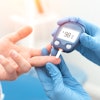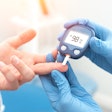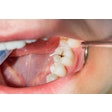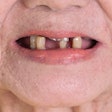
NEW YORK (Reuters Health) Feb 14 Periodontal disease is associated with the development of overt nephropathy and end-stage renal disease (ESRD) in patients with type 2 diabetes, according to a study published in the February issue of Diabetes Care.
Dr. Wendy A. Shultis, of the National Institutes of Health in Phoenix, and colleagues studied 529 type 2 diabetic subjects living in the Gila River Indian Community who were at least 25 years of age and had at least one periodontal examination.
Initially, the participants had an estimated glomerular filtration rate of at least 60 mL/min per 1.73 m² and no macroalbuminuria (urinary albumin-to-creatinine ratio at least 300 mg/g). The number of teeth and alveolar bone score were used to classify periodontitis as none/mild, moderate, severe, or edentulous. The patients were followed for a mean of 22 years to development of macroalbuminuria or ESRD, which was defined as renal replacement therapy or death attributed to diabetic nephropathy.
Of the 529 subjects in the study, 107 (20%) had none/mild periodontitis, 200 (38%) had moderate periodontitis, 117 (22%) had severe periodontitis, and 105 subjects (20%) were edentulous at baseline.
A total of 193 subjects developed macroalbuminuria within a median follow-up period of 9.4 years. During a median follow-up of 14.9 years, 68 subjects developed ESRD.
Moderate and severe periodontitis and edentulousness predicted the development of macroalbuminuria in a dose-dependent manner. After adjustment for age, sex, duration of diabetes, BMI, and smoking, the hazard rate ratios (HRRs) for moderate periodontitis, severe periodontitis and edentulousness were 2.0, 2.1, and 2.6, respectively (p = 0.01).
Periodontitis also predicted ESRD after multivariate adjustment. The corresponding HRRs were 2.3, 3.5, and 4.9 (p = 0.02).
"A proposed mechanism for the effect of periodontitis on the development of kidney disease is systemic inflammation," Dr. Shultis and colleagues explain. "Both periodontitis and kidney disease are associated with inflammatory markers such as C-reactive protein, and chronic low-level inflammation associated with periodontitis may lead to endothelial dysfunction, which plays a role in the pathogenesis of kidney disease."
Diabetes Care 2007;30:306-311.
Copyright © 2007 Reuters Limited. All rights reserved. Republication or redistribution of Reuters content, including by framing or similar means, is expressly prohibited without the prior written consent of Reuters. Reuters shall not be liable for any errors or delays in the content, or for any actions taken in reliance thereon. Reuters and the Reuters sphere logo are registered trademarks and trademarks of the Reuters group of companies around the world.



















